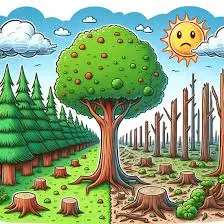Speech on Deforestation

Speech on Deforestation : Deforestation meaning
Speech on Deforestation – It’s a term we often hear, perhaps too frequently, yet its gravity is often overlooked. Imagine waking up one day to find that the lush green canopy that once blanketed our Earth has vanished, leaving behind barren landscapes and a silent echo where vibrant ecosystems once thrived. This isn’t a far-off dystopian future— it’s a reality we are facing today. As we delve into the depths of this issue, it becomes increasingly clear that the urgency to address deforestation has never been more pressing. Speech on Deforestation
The Significance of Forests
Forests are not merely collections of trees; they are complex ecosystems teeming with life and biodiversity. They are the lungs of our planet, absorbing carbon dioxide and releasing oxygen, thus playing a critical role in mitigating climate change. Additionally, forests are home to millions of species, many of which are yet to be discovered. They provide habitat, food, and shelter for countless organisms, contributing to the richness and diversity of life on Earth. Speech on Deforestation
Furthermore, forests play a crucial role in regulating local and global climates. Through the process of transpiration, trees release water vapor into the atmosphere, which helps to create rainfall patterns and regulate temperature. This moisture recycling process is vital for agriculture, water security, and overall climate stability.
Moreover, forests are deeply intertwined with human livelihoods. They provide essential resources such as timber, food, medicine, and fuelwood, supporting the livelihoods of millions of people around the world, particularly in rural and indigenous communities. Forests also offer recreational and cultural value, serving as sacred spaces and sources of inspiration for countless cultures and traditions.
Speech on Deforestation : Causes of Deforestation
What are the ill effects of deforestation
Despite their immense ecological and societal value, forests are under threat from various human activities. One of the primary drivers of deforestation is agricultural expansion, particularly for large-scale farming and cattle ranching. As global demand for food and animal products continues to rise, forests are cleared to make way for agricultural land, leading to extensive deforestation in regions such as the Amazon rainforest and Southeast Asia.
According to report by Food and Agriculture Organization, almost 50% of forests in tropical regions have been cleared. This is majorly by Tribal communities that are involved in subsistence farming. The agricultural method they adopt called slash and burn agriculture.
Logging for timber and paper products is another significant cause of deforestation. Unsustainable logging practices, including clear-cutting and illegal logging, result in the destruction of vast forested areas, disrupting ecosystems and depleting valuable timber resources. Additionally, infrastructure development projects such as roads, highways, and dams often require the clearing of forests, further exacerbating deforestation rates.
The rate in increase in population leads to need of greater land, to achieve this demands of foods & housing forests are cleared in aimlessly. Land cleared for agriculture and settlements is the biggest cause of depleting forest land all over world.
Speech on Deforestation : Environmental Consequences
The consequences of deforestation are far-reaching and profound, affecting both the environment and the global climate. One of the most immediate impacts of deforestation is the loss of biodiversity. As forests are cleared, countless plant and animal species lose their habitat, leading to declines in population sizes and increased extinction risk. Deforestation also disrupts ecological networks and food chains, further endangering the delicate balance of ecosystems.
Moreover, deforestation significantly contributes to climate change by releasing carbon dioxide into the atmosphere. Trees act as carbon sinks, absorbing carbon dioxide during photosynthesis and storing it in their biomass. When forests are cleared or burned, this stored carbon is released back into the atmosphere, contributing to greenhouse gas emissions and exacerbating global warming.
Furthermore, deforestation can lead to soil degradation, erosion, and loss of fertility. Tree roots help to bind soil together, preventing erosion and maintaining soil structure. When forests are cleared, soil becomes exposed to erosion by wind and water, leading to nutrient loss and reduced agricultural productivity. Additionally, deforestation increases the risk of landslides, floods, and other natural disasters, posing a threat to human communities living in forested areas.
Speech on Deforestation : Societal Implications
The impacts of deforestation extend beyond the environment, affecting human societies and communities in profound ways. Indigenous peoples, who depend on forests for their livelihoods, culture, and identity, are disproportionately affected by deforestation. As forests are cleared, indigenous communities lose access to traditional lands, resources, and sacred sites, threatening their way of life and cultural heritage.
Moreover, deforestation poses a significant threat to global food security. Forests provide essential ecosystem services such as pollination, soil fertility, and water regulation, which are critical for agricultural productivity. As forests are cleared, these ecosystem services are diminished, leading to declines in crop yields, increased vulnerability to pests and diseases, and food shortages in vulnerable regions.
Additionally, deforestation has profound economic costs, both locally and globally. The loss of ecosystem services provided by forests, such as carbon sequestration, water purification, and climate regulation, can have far-reaching economic consequences, affecting industries such as agriculture, tourism, and fisheries. Furthermore, the degradation of forest ecosystems can lead to increased healthcare costs, as communities are exposed to air and water pollution, diseases, and other health hazards associated with deforestation.
Speech on Deforestation : Solutions to Deforestation
Addressing deforestation requires a multifaceted approach that addresses the root causes of the issue while promoting sustainable land management practices and conservation efforts. One of the most critical strategies is the implementation of strong government policies and regulations to protect forests and promote sustainable land use practices. This includes measures such as land-use planning, forest zoning, and protected area management, as well as the enforcement of laws against illegal logging and land clearing.
Furthermore, promoting sustainable agriculture and forestry practices can help to reduce the pressure on forests and mitigate deforestation rates. Agroforestry, for example, combines agricultural crops with tree planting, providing multiple benefits such as soil conservation, biodiversity conservation, and increased resilience to climate change. Similarly, sustainable logging practices, such as selective logging and reduced-impact logging, can help to minimize the environmental impact of timber extraction while ensuring the long-term viability of forest resources.
Moreover, international cooperation and collaboration are essential for addressing deforestation on a global scale. Initiatives such as REDD+ (Reducing Emissions from Deforestation and Forest Degradation) aim to incentivize forest conservation and sustainable land management practices by providing financial incentives for carbon sequestration and emissions reductions. Additionally, partnerships between governments, NGOs, and local communities can help to build capacity, share knowledge and resources, and promote collaborative approaches to forest conservation and sustainable development.
Conclusion
Deforestation is a complex and urgent issue that requires immediate action to address its far-reaching environmental, social, and economic impacts. The destruction of forests not only threatens biodiversity, climate stability, and ecosystem services but also jeopardizes the livelihoods, cultures, and well-being of millions of people around the world. However, by implementing strong policies, promoting sustainable practices, and fostering international cooperation, we can work together to protect and restore our forests for future generations. As stewards of this planet, it is our collective responsibility to heed the forest’s cry and take decisive action to preserve the precious ecosystems that sustain life on Earth.
Deforestation slogans
1.”Save Trees, Save Lives: Stop Deforestation!”
2.”Forests Are Our Future: Say No to Deforestation!”
3.”Deforestation Stops Here: Protect Our Trees, Protect Our Planet!”
4.”Every Tree Counts: Stand Up Against Deforestation!”
5.”Don’t Let Our Forests Fade Away: Fight Deforestation Today!”
6.”From Roots to Canopy, Deforestation Harms Us All!”
7.”Deforestation: The Silent Crisis That Speaks Volumes!”
8.”Plant Trees, Not Deforestation: Choose Sustainability!”
9.”Protect Our Lungs: Stop Deforestation, Save Our Oxygen!”
10.”Deforestation: A Path to Destruction. Let’s Choose Conservation!”
Report on Road Accident : Link
Go thorough below link for video : Link
For more information on other website click here : Link
Thank You for your valuable time…!
For more information on our website click here : Link
